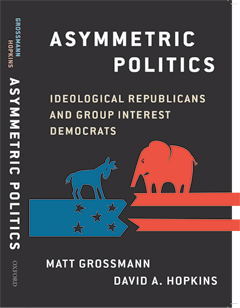Republicans embrace conservative values, smaller and simpler government and leaders who remain true to their beliefs.
On the other side of the aisle, Democrats focus on particular policy issues, think of politics as a battle among social groups and seek compromise to achieve pragmatic interests.
The great divide between America’s two major political parties is explored in depth in the just-published Asymmetric Politics: Ideological Republicans and Group Interest Democrats co-authored by Michigan State University political scientist Matt Grossmann and Boston College political scientist David A. Hopkins.
Published by Oxford University Press, Asymmetric Politics was launched this September as Amazon’s No. 1  new release in its political ideology category. It quickly won praise as offering new insights, detailed observations and careful research into the country’s polarized politics.
new release in its political ideology category. It quickly won praise as offering new insights, detailed observations and careful research into the country’s polarized politics.
America’s political divide isn’t an equal departure from a moderate center, with parties mirror images in their approaches to campaigning and governing, Grossmann and Hopkins write.
Instead, each party woos different voters, nominates candidates in separate ways and forges governing styles distinct from each other. Republicans and Democrats differ sharply even in how they are organized and in how they present their views to the public.
The two parties have developed differently during the past 50 years, and given an American electorate that sides with Democratic policies and Republican’s vision of limited government, the polarizing rift isn’t likely to be soon healed.
“One party is battling for an ideology; the other is battling for groups of people. They’re fighting, in other words, over different things,” the political scientists write in a recent post on The Washington Post’s Monkey Cage blog.
“What’s more, we find that Republicans are consistently more likely to identify themselves as conservatives than Democrats are to consider themselves liberals.
Republicans are also more likely to say they believe that their party should stand up for its principles and become more ideologically pure, while Democrats tend to favor pragmatic compromise and a more moderate party.”
Grossmann, author, editor, or co-author of six books on politics, is director of the Institute for Public Policy and Social Research (IPPSR) in MSU’s College of Social Science. IPPSR specializes in policy education, political leadership and survey research. It is home to the Michigan Political Leadership Program, the Public Policy Forum Series, Office for Survey Research and State of the State Survey.
Winning Favorable Reviews
The book has won solidly favorable reviews. Writes Ezra Klein, editor-in-chief of the online publication Vox: “Grossmann and Hopkins’ research decisively shows that the two parties are not the same – and once you understand the ways in which they’re different, American politics begins to make a lot more sense.”
In rallying voters, Grossmann and Hopkins write, Democrats are more likely to speak of the group endorsements and social ties that bind. In recruiting, Republicans are more likely to look for candidates who share their conservative values. In office, Republicans stress loyalty to party views. Democratic officeholders are more likely to be active in issue- and identity-based caucus es.
es.
Republicans have built an infrastructure of conservative media unanswered by opponents. Democrats have relied on more objective outlets less inclined to align with candidates or parties, to spread their messages, the authors write.
GOP presidential nominee Donald Trump honed his brand through conservative voices on cable television and talk radio. In a recent op-ed in the Detroit Free Press, Grossmann and Hopkins predicted that Trump will not transform the Republican Party nor reduce its influence.
Their research also explains Hillary Clinton’s presidential campaign wins against Democratic opponent Vermont Sen. Bernie Sanders. She aimed at key Democratic social and demographic groups to seal her spot at the top of the party’s November 2016 ticket.
Researchers working in higher education and scientific professions have also come under conservative fire in comparison to policy groups – or “think tanks” – organized around Republican themes. “As a result, Republican voters, activists, and politicians are more likely to live in an information cocoon, walled off from ideologically inconvenient evidence,” Grossmann and Hopkins conclude.
Voters too have played a role in the split, sending mixed messages to political leaders. If voters continue to support Democratic policies and Republican’s small government vision, it’s no wonder each party sees itself as the more correct.
The result is a “persistently competitive national battle,” the authors say in the volume that gathers research from decades of surveys, records, reviews, archives, data collections, letters, committee hearings, party platforms and media coverage.
Together, Grossmann and Hopkins call for party leaders, supporters and voters from each party to learn more about each other. “Building a stronger democracy requires acknowledging – or even better, resolving – the contradictions in our own collective political mind.”